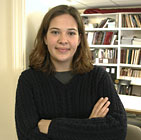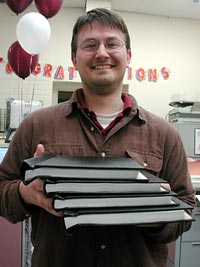The Truth About the “T” Word
The Truth About the “T” Word
Reprinted by permission from The Bates Student

Article by Joanna Standley ’01 for The Bates Student, January 30, 2001.
According to the Bates College Catalog, the senior thesis is a “significant research, service, performance, or studio project in the final year of study in the major.” However, whether you’re a current senior, or just know someone who is, you know that the T-word can seem more like the bane of Batesies’ existence. But what is thesis really, beyond a really long paper that consumes half or all of one’s final year at Bates? Six seniors expose the good, the bad and the ugly of the thesis experience.
One of the more daunting aspects of senior thesis is determining a topic that will sustain your interest, even at the most trying moments. After spending her junior year in Spain, Molly Whitehead found herself back at Bates in September and in need of a topic for her first-semester Spanish thesis fast. To her disappointment, the topic she had hoped to pursue ending up being too broad and she had to work with her advisor to narrow the focus. “I came in with a totally different idea of what I wanted to do from what I actually ended up with. Because I was not 100% excited about my topic I think it was more stressful. The key is to pick something that you will not get bored of,” said Whitehead.
Whitehead is more hopeful about the thesis she is doing this semester for her second major — Child and Family Studies. She is studying pregnancy among Latina adolescents and has the opportunity to incorporate a service learning component into her thesis, which she hopes will enhance her experience. “My focus is not only the actual writing I will be doing, but the practical experience I am gaining from working in an organization,” said Whitehead.
Steve Rees, a political science major who plans to attend law school, wrote his first-semester thesis on progressive legal assistance programs in Maine, a topic he first studied in a seminar. “This is something you are going to be working on for a long time and it has to be something you are really interested in, otherwise you will hate every moment of it,” said Rees.
Like Rees, many students decide to pursue a topic which they first encounter in a class. Tom Armet, a neuroscience major, is investigating calcium’s role in glutamate-mediated excitotoxicity. (“Excitotoxicity is what happens to your neurons during stroke,” he explains). Armet became intrigued by the topic during lab for Biology 338, Drug Actions on the Nervous System. “I asked my professor about it and she suggested I apply for a grant to investigate the topic over the summer,” Armet said.
For other students, thesis presents the opportunity to turn a personal interest into an academic pursuit. After three years of hosting shows on WRBC and DJing with friends, political science major Ted Powers decided to study the political significance of drum n’ bass music.
 Based on their own experiences, seniors agree that it’s never to early to start thinking about thesis, whether it’s talking to professors about potential topics or starting to look for research. “Once you have a specific topic in mind, go and talk to your advisor to get a head start on the theoretical literature involving your topic,” suggests Powers, who wishes he had done the same.
Based on their own experiences, seniors agree that it’s never to early to start thinking about thesis, whether it’s talking to professors about potential topics or starting to look for research. “Once you have a specific topic in mind, go and talk to your advisor to get a head start on the theoretical literature involving your topic,” suggests Powers, who wishes he had done the same.
Reflecting on her first-semester experience, Whitehead agrees. “It would have been really good if I had started the process my junior year so that over the summer and in the beginning of the year I would have already been researching.” She advises juniors to discuss possible ideas with a professor “before you have to make the decision [on a topic] because the deadline is coming up for the proposal.”
Michael McCarthy, a history and political science double major whose year-long thesis focuses on the economic ideas of Martin Luther King, Jr., urges students to “start thinking about thesis whenever they discover some idea that goes beyond the work they are doing at the time.”
For Armet, the opportunity to begin his research over the summer has definitely eased his thesis anxiety. “The sooner you start, the better. If I hadn’t gotten a head start this summer, I probably wouldn’t have been able to do the project I’m working on now, and my work probably wouldn’t be as far along as it is right now.”
Biochemistry major Naomi Pick discussed the important role a student’s thesis advisor plays. “By comparing my experience with my friends’, I’ve seen that your advisor makes the largest impact on your thesis experience,” said Pick, who is studying gene recombination in c. elegans worms. For Pick, doing her thesis has not been as stressful as she had expected because “my advisor makes reasonable requests of my time and my abilities.” She urges students to talk to a variety of professors before selecting an advisor. “Make sure you know your advisor and the type of work they’d expect from you before you commit.”
Rees agreed that a supportive advisor is key to having an enjoyable thesis experience. He suggests selecting an advisor with whom you have already established a relationship. “Try to work with someone you already know and who knows you interests,” said Rees.
While a supportive advisor is key to having an enjoyable thesis experience, seniors spoke about the self-discipline and time management that an independent project like thesis demands. Whitehead admitted that initially she expected more supervision from her advisor, although she quickly learned how to be more of an independent researcher. “Starting from scratch with little guidance is something very different from what you experience in most of your classes,” she said.
Said McCarthy, “Thesis has definitely challenged me to develop my own schedule. It is as if I developed my own course with the aid of two professors and then set out to teach myself.” “It’s all about structuring your own time and learning to be responsible for your own work and your own results, said Pick.
So, does thesis really deserve the bad rap it gets from caffeine-infused, sleep-deprived seniors? Whitehead explained that she used to think that her senior friends were exaggerating about how much work thesis involved, until she experienced it first hand. “I always thought it couldn’t be that bad, they just hadn’t started working early enough or were not managing their time enough. Well, I found out that it is really just that you have that much work.”
Referring to thesis as the “never ending project,” Rees explained how thesis can give a new meaning to the word stress. “Even when you handed in a chapter, you had to turn right around and start the next one,” he said.
However, most seniors agree that the intellectual rewards of completing a thesis far outweigh the many late nights. For McCarthy, thesis has been his most rewarding academic experience at Bates. “Deadlines are a depressing reality, but reading my material and developing new ideas is well worth the effort.”
Rees pointed to the sense of accomplishment he felt upon completing his thesis in December. “It gave my major a real meaning. It was a nice finale to my Bates education.”
For Pick, her thesis experience has allowed her to apply all the knowledge she has gained from classes over the past four years. “Every lab technique and concept comes together in your thesis work,” she said.
“It is honestly the culmination of my entire academic experience. I am drawing upon everything I have learned throughout the years here and applying it to my thesis,” said Armet, who called his thesis the most challenging academic pursuit of his life.
As seniors begin to look towards graduation, they note that the skills they have gained from working on their thesis will be especially valuable as they move beyond the Bates bubble. While Rees said that every employer he has interviewed with thus far was interested in his thesis experience, Whitehead anticipates that her Child and Family Studies thesis will provides a “transition from my academic work to my potential life’s work.”